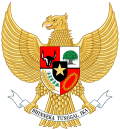Selected articles archive and schedule for August 2006
Last updated: 12:25, 14 August 2006 (UTC)
- August 11 - August 13
Portal:Indonesia was created.
The Indonesian Declaration of Independence was officially read at exactly 10.00 a.m. on Friday, August 17, 1945.
The draft was prepared only a few hours before earlier, on the night of August 16, by Soekarno, Hatta, and a student named Subarjo, at Admiral Tadashi Maeda's house, Miyako-Doori 1, Jakarta (now the "Museum of the Declaration of Independence", JL. Imam Bonjol I, Jakarta). Maeda himself was sleeping in his room upstairs. He was agreeable to the idea of Indonesia's independence, and had lent his house for the drafting of the declaration. Marshal Terauchi, the highest-ranking Japanese leader in South East Asia and son of Prime Minister Terauchi Masatake, was however against Indonesia's independence, scheduled for August 24. (read more...)
view -
talk -
history
- August 14 - August 20
The Constitution of Indonesia (Indonesian: Undang-Undang Dasar Republik Indonesia 1945, UUD '45) is the basis for the government of the Indonesia.
The constitution was written in July and August 1945, when Indonesia was emerging from Japanese control at the end of World War II. It was abrogated by the Federal Constitution of 1949 and the Provisional Constitution of 1950, but restored on July 5, 1959.
The 1945 Constitution then set forth the Pancasila, the five nationalist principles devised by Sukarno, as the embodiment of basic principles of an independent Indonesian state. It provides for a limited separation of executive, legislative, and judicial power. The governmental system has been described as "presidential with parliamentary characteristics." Following the Indonesian 1998 Revolution and the resignation of President Suharto, several political reforms were set in motion, which are still continuing. (read more...)
view -
talk -
history
- August 21 - August 28
The 2004 Indian Ocean earthquake, known by the scientific community as the Sumatra-Andaman earthquake, was an undersea earthquake that occurred at 00:58:53 UTC (07:58:53 local time) December 26, 2004, with an epicentre off the west coast of Sumatra, Indonesia. The earthquake triggered a series of devastating tsunamis that spread throughout the Indian Ocean, killing large numbers of people and inundating coastal communities across South and Southeast Asia, including parts of Indonesia, Sri Lanka, India, and Thailand. Although initial estimates have put the worldwide death toll at over 275,000 with thousands of others missing, recent analysis compiled lists a total of 229,866 persons lost, including 186,983 dead and 42,883 missing. The figure excludes 400 to 600 people who are believed to have perished in Myanmar which is more than that government's official figure of only 61 dead. The catastrophe is one of the deadliest disasters in modern history. The disaster is known in Asia and in the international media as the Asian Tsunami, and also called the Boxing Day Tsunami in Australia, Canada, New Zealand, and the United Kingdom as it took place on Boxing Day. (read more...)
view -
talk -
history
- August 28 - September 3
Bandung is located in the middle of the West Java province, around 180 km south-east of Jakarta. It lies 768 m above the sea level, which makes its climate is cooler throughout the year than most of Indonesian cities.
The topology of Bandung is actually a basin in the middle of the ring of mountains. To the north is Lembang with the famous "flipped-boat" shape mount Tangkuban Perahu. Other high peaks include Burangrang and Tunggul Hill. During the Pleistocene epoch, the Sunda volcanic mountain was formed with the elevation as high as 3,000-4,000 m. Burangrang and Bukit Tunggul were two of the small peaks. Then this giant mountain was erupted, creating a huge caldera. (read more...)
view -
talk -
history



